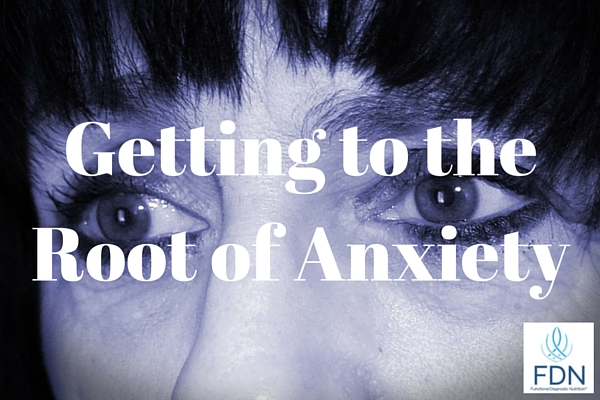Every day functional health coaches deal with clients who struggle with anxiety and who are looking for answers and solutions. Anyone who has struggled with anxiety can tell you that it is a terrifying experience. Imagine experiencing your worst nightmare come true on a regular basis. Those who suffer from anxiety live with fear continually. It is not only terrifying but it is exhausting for those who endure it. Unfortunately, the many who do suffer from anxiety simply don’t understand why they feel out of sorts, why they are so afraid or why they feel bad all of the time. Do you struggle with anxiety?
The symptoms of anxiety include:
- Feelings of worry or stress that are excessive
- Fatigue, even after a full night sleep-feel tired all the time for no reason
- Sleep troubles: problems falling or staying asleep
- Easily startled
- A view of everyday problems that is unrealistic
- Unusual cravings for sugar, sweets and/or highly processed carbohydrates
- Feelings of being not normal, different, odd, strange or just not right
- Headaches
- Body aches, as if the muscles are bruised
- Irritability
- Feeling “on edge” frequently
- Lightheaded, feel like you are going to faint
- Nervous energy, excess energy, and feeling of not being able to relax
- Nausea
- Difficulty concentrating
- Tightness in chest or chest pain
- Rapid heartbeat
- Heart palpitations, feelings like your heart is skipping beats
- Sweating
- Feeling cold, having the chills
- Dizziness or vertigo
- Pounding Heart
- Weakness in the arms or legs
- Need to urinate urgently
- Sexual problems, lack of interest in sex
- Difficulty breathing
- Short term memory loss
- Frequently feel overwhelmed
- Feel like you are going crazy
- Fear that you are going to die
- Racing thoughts
- Unrealistic fears
This list is fairly long, but by no means is the list above an exhaustive list of anxiety symptoms. Unfortunately many live for years with the symptoms before seeking help…..some never seek help, but shut themselves off from the world.
People who suffer from anxiety know logically that something is wrong. They simply don’t feel normal. But they don’t understand why. Some feel as if they are going crazy. Some feel as if they are going to die. If you are struggling with anxiety, there is hope. You do not have to live your life locked in the prison of the symptoms of anxiety.
If you do struggle with anxiety, it is important that you take the time to work with an FDN Practitioner that can help you to get to the root of the issues that are causing your anxiety to begin with.
One common cause of anxiety is hormone imbalance. Chronic stress, poor eating habits and sleep deprivation, along with exposure to toxins that can negatively impact the endocrine system can cause an imbalance in hormone levels.
- Work with an FDN Practitioner! A qualified FDN Practitioner can help you by giving you access to functional lab testing that can clearly define where there may be hormone imbalance occurring. They can interpret the lab results and help you to take proper steps required to bring balance back to your hormones. An FDN Practitioner will help you to understand how the proper diet, exercise, rest, and stress management play a part in reclaiming your health and can help you to choose the right supplements to support your body so that you will see results.
- Make sure you are eating regular meals. Many people are unaware that shifting blood sugar levels can actually affect anxiety levels. When your blood sugar is low, anxiety can increase. You can help keep blood sugar levels balanced by reducing the amount of processed sugar that you consume. If you must eat sugar (including fruit), then it’s best to also eat some high quality protein (preferably from pasture raised animal sources) and high quality fat (virgin coconut oil, real butter, lard, tallow). The protein and fat help to prevent the blood sugar from spiking and falling quickly, which can help anxiety levels. You should work with your doctor and be tested for hypoglycemia if you are concerned that blood sugar issues could be a problem for you.
- Breathe deeply. Deep breathing can actually reduce or eliminate light to moderate levels of anxiety. The flood of oxygen stops the body’s fight or flight stress response. It only takes a few minutes of slow, relaxed, deep breathing to feel results….and you can do this anywhere!
- Exercise. Regular movement helps the body to produce and release critical neurotransmitters such as serotonin and GABA. Deficiency of these neurotransmitters can contribute to stress and anxiety.
- Turn off technology. You can actually become over-stimulated by too much input from technology. This is particularly true if you watch the news frequently or are a fan of action filled or scary movies and television shows. When feeling anxious, it’s best to surround yourself with soothing things. Some soft music, or a funny movie will help your anxiety much more than two hours of the latest horror flick.
Feeling anxious on a regular basis is not normal, and you do not need to continue to struggle with anxiety alone. Contact an FDN Practitioner today and they can get you on the road to feeling better soon.







